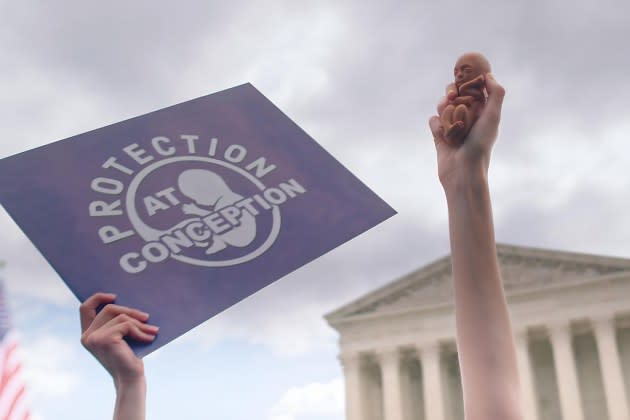‘Preconceived’ Review: Illuminating Debut Doc Peeks Behind the Curtain of Crisis Pregnancy Centers

Two years ago, the United States Supreme Court overturned Roe v. Wade, effectively ending the constitutional right to abortion and giving states leeway to criminalize the procedure. The harrowing moment had been years in the making. Since the landmark decision was made in 1973, anti-abortion advocates have been organizing on a local level to chip away at the protection and champion its demise.
With their documentary Preconceived, debut filmmakers Sabrine Keane and Kate Dumke offer another entry point into understanding the scale and impact of this decision. The film uncovers the mysteries and contradictions shrouding crisis pregnancy centers, offices around the United States that bill themselves as abortion clinics. In reality, these places do not offer the service (or any medical ones, really). They are, rather, a covert prevention method, strategically located and advertised to attract pregnant people looking for an abortion only to mislead them. Once patients walk through the door, crisis pregnancy center workers start building a case against getting an abortion at all.
More from The Hollywood Reporter
'Civil War' First Reactions From Premiere: "Scary as Hell Cautionary Tale"
'Doin' It' Review: Lilly Singh's High-School Sex-Ed Comedy Gets an Incomplete
Keane and Dumke’s doc revolves around two women who encountered these centers during pregnancy and made different decisions. Maleeha, an older Pakistani woman, mistakenly ended up at a CPC when she was 20. She had recently immigrated to the United States and was pregnant. A search for affordable healthcare was met with uncomfortable evangelizing and rampant misinformation. When Maria, a young mother from a Catholic family, stumbled upon a crisis center, the messaging worked. She decided to keep the baby, and Preconceived observes how she navigates the scarcity of material support available after mothers decide to give birth.
Their stories anchor the documentary in an intimacy that bolsters its more investigative threads. Although Maleeha’s story offers the clarity of hindsight (she got an abortion and had a child later, when she was ready), it would have provided added depth to find an additional subject closer to Maria’s age who was counseled by one of these centers and still chose an abortion. What happens to a young mother who exercises this right? What emotions might surface from feeling ownership over her body? Crisis pregnancy centers wield shame and guilt as prevention tools. Their arguments against abortion are sustained through emotional manipulation, so it would have been revealing to see an up-close example of their failure.
The strength of Preconceived lies in its access to a broad range of perspectives and in the quiet force of the interviews. Keane and Dumke speak to representatives from Stanton Healthcare, one of the more than 2,500 crisis pregnancy centers around the country; Heartbeat International, a pro-life organization that provides many CPCs with resources; and Hope Medical Group for Women, an actual abortion clinic. These conversations paint an assured portrait of the anti-abortion operations brewing across the nation. The directors learn how crisis pregnancy centers open, the marketing strategies they use, how they function on a daily basis, how they store sensitive medical information and where they fit into the broader national legislative battle over abortion.
Keane and Dumke smartly let their interviewees speak for themselves, interjecting only to fact check in real time. This approach reveals the web of deceit and the contradictions inherent to the crisis pregnancy center missions and the broader pro-life movement. Armed with this information, audiences are better equipped to understand the strength and effectiveness of the right-wing ecosystem that made abortion a key issue for the Republican Party. It becomes clear how elected officials who profess to care about the sanctity of life consistently vote against legislation that would give young, poor mothers access to better care and more resources. One begins to see how abortion functions as a proxy war for ideological anxieties — how it’s used to point out a phantom spiritual rot in American society.
The result is a compelling, convincing and informative documentary that makes the abstraction of a law more concrete. By focusing on crisis pregnancy centers, Preconceived offers a tangible example through which people might understand abortion and the necessity of Roe v. Wade. The documentary reveals just how few people realize that protecting the “potentiality of human life,” to quote the Supreme Court’s opinion, actually jeopardizes the well-being of parents and their newborns.
Best of The Hollywood Reporter